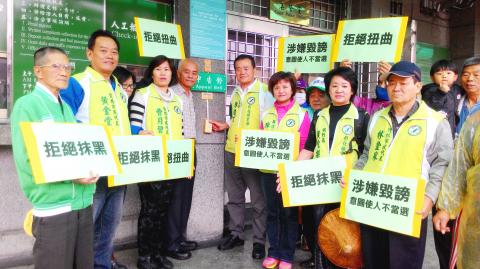The Chinese Nationalist Party (KMT) yesterday accused Democratic Progressive Party (DPP) presidential candidate Tsai Ing-wen (蔡英文) of suppressing freedom of speech, after the DPP took legal action against several of the ruling party’s local branches over banners associating Tsai with US pork imports containing the controversial animal feed additive ractopamine.
“Tsai’s attitude toward imports of ractopamine-laced US pork was clearly revealed by her remarks at the first televised presidential debate on Dec. 27, during which she said the nation should use Japan’s and South Korea’s legal standards for the leanness-enhancing feed additive as a reference,” Culture and Communications Committee director-general Lin Yi-hua (林奕華) told a press conference in Taipei yesterday.
Lin said that the KMT merely printed Tsai’s stance toward the issue on banners, only to see the DPP file lawsuits against the party’s local branches in Yunlin, Changhua and Chiayi counties on charges of aggravated defamation and violating Article 104 of the Civil Servants Election and Recall Act (公職人員選舉罷免法).

Photo: Lin Liang-che, Taipei Times
Article 104 of the act stipulates that violators face up to five years in prison for disseminating rumors or spreading falsities by text, picture, audio tape, videotape, speech or any other method that causes a candidate to lose an election.
“Despite being only a presidential candidate, Tsai has begun to quell freedom of expression,” Lin said.
Lin was referring to banners manufactured by the local branches that read: “Supporting Tsai Ing-wen is tantamount to supporting the import of US pork containing ractopamine.”
The banners have been seen in various places in the three counties following the TV debate, prompting the DPP to file lawsuits over the past few days.
KMT’s Yunlin County Branch director Hsu Yu-chen (許宇甄) said the DPP should have taken legal actions against its own chairperson, whose integrity has been called into questions after she took a U-turn from the party’s opposition against imports of ractopamine-tainted US pork in 2012.
“Regardless, it is an honor for the KMT to be sued over its attempts to safeguard Taiwanese pig farmers and the public’s food safety,” Hsu said.
KMT Changhua County branch director Chen Ming-chen (陳明振) said that opening the nation’s doors to US pork containing ractopamine residues would deter women from the tradition of consuming pig’s kidneys after giving birth.
KMT Chiayi County Branch director Yen Wen-cheng (顏文正) said Tsai’s inclination to relax the import ban on US pork with ractopamine could be evidenced by an article penned by Chiayi County Commissioner Helen Chang (張花冠) of the DPP in April last year — months before Tsai’s US visit.
“Chang said in the article that the impact of importing US pork on the sales of domestically farmed pork was marginal, remarks that are apparently aimed at keeping in line with Tsai’s policies,” Yen said.
KMT Culture and Communications Committee deputy director-general Lee Ming-hsien (李明賢) said that since National Taiwan University College of Public Health associate professor Wu Kun-yuh (吳焜裕), a food safety expert, is on the top of the DPP’s list of legislator-at-large candidates, he should also say something about Tsai’s flip-flopping on the issue.

Chinese Nationalist Party (KMT) Chairman Eric Chu (朱立倫), spokeswoman Yang Chih-yu (楊智伃) and Legislator Hsieh Lung-chieh (謝龍介) would be summoned by police for questioning for leading an illegal assembly on Thursday evening last week, Minister of the Interior Liu Shyh-fang (劉世芳) said today. The three KMT officials led an assembly outside the Taipei City Prosecutors’ Office, a restricted area where public assembly is not allowed, protesting the questioning of several KMT staff and searches of KMT headquarters and offices in a recall petition forgery case. Chu, Yang and Hsieh are all suspected of contravening the Assembly and Parade Act (集會遊行法) by holding

PRAISE: Japanese visitor Takashi Kubota said the Taiwanese temple architecture images showcased in the AI Art Gallery were the most impressive displays he saw Taiwan does not have an official pavilion at the World Expo in Osaka, Japan, because of its diplomatic predicament, but the government-backed Tech World pavilion is drawing interest with its unique recreations of works by Taiwanese artists. The pavilion features an artificial intelligence (AI)-based art gallery showcasing works of famous Taiwanese artists from the Japanese colonial period using innovative technologies. Among its main simulated displays are Eastern gouache paintings by Chen Chin (陳進), Lin Yu-shan (林玉山) and Kuo Hsueh-hu (郭雪湖), who were the three young Taiwanese painters selected for the East Asian Painting exhibition in 1927. Gouache is a water-based

Taiwan would welcome the return of Honduras as a diplomatic ally if its next president decides to make such a move, Minister of Foreign Affairs Lin Chia-lung (林佳龍) said yesterday. “Of course, we would welcome Honduras if they want to restore diplomatic ties with Taiwan after their elections,” Lin said at a meeting of the legislature’s Foreign Affairs and National Defense Committee, when asked to comment on statements made by two of the three Honduran presidential candidates during the presidential campaign in the Central American country. Taiwan is paying close attention to the region as a whole in the wake of a

OFF-TARGET: More than 30,000 participants were expected to take part in the Games next month, but only 6,550 foreign and 19,400 Taiwanese athletes have registered Taipei city councilors yesterday blasted the organizers of next month’s World Masters Games over sudden timetable and venue changes, which they said have caused thousands of participants to back out of the international sporting event, among other organizational issues. They also cited visa delays and political interference by China as reasons many foreign athletes are requesting refunds for the event, to be held from May 17 to 30. Jointly organized by the Taipei and New Taipei City governments, the games have been rocked by numerous controversies since preparations began in 2020. Taipei City Councilor Lin Yen-feng (林延鳳) said yesterday that new measures by